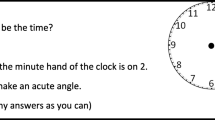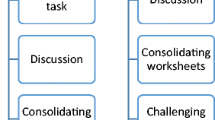Abstract
This study explores the extent to which a teacher elicited students’ mathematical reasoning through the use of challenging tasks and the role her knowledge played in doing so. I characterised the teacher’s knowledge in terms of a local theory of instruction, a form of pedagogical content knowledge that involves an empirically tested set of conjectures situated within a mathematical domain. Video data were collected and analysed and used to stimulate the teacher’s reflection on her enactments of an instructional sequence. The teacher, chosen for how she consistently elicited student reasoning, showed evidence of possessing a local theory in that she articulated the ways student thinking developed over time, the processes by which that thinking developed, and the resources that facilitated the development of student thinking. Her knowledge informed how she revised and enacted challenging tasks in ways that elicited and refined student thinking around integer addition and subtraction. Furthermore, her knowledge and practices emphasised the progressive formalisation of students’ ideas as a key learning process. A key implication of this study is that teachers are able to develop robust knowledge from enacting challenging tasks, knowledge that organises how they elicit and refine student reasoning from those tasks.
Similar content being viewed by others
Notes
The names of the teachers and students are pseudonyms.
References
Cai, J., Moyer, J. C., Wang, N., & Nie, B. (2009). Learning from classroom instruction in a curricular content: An analysis of instructional tasks. Paper presented at the 31st annual meeting of the North American Chapter of the International Group for the Psychology of Mathematics Education, Atlanta, GA: Georgia State University.
Carpenter, T. P., Blanton, M. L., Cobb, P., Franke, M. L., Kaput, J., & McClain, K. (2004). Scaling up innovative practices in mathematics and science (Research report). Madison: National Center for Improving Student Learning and Achievement in Mathematics and Science.
Cobb, P., Confrey, J., diSessa, A., Lehrer, R., & Schauble, L. (2003). Design experiments in education research. Educational Researcher, 32(1), 9–13.
Cobb, P., Zhao, Q., & Dean, C. (2009). Conducting design experiments to support teachers' learning: A reflection from the field. Journal of the Learning Sciences, 18(2), 165–199.
Collopy, R. (2003). Curriculum materials as a professional development tool: How a mathematics textbook affected two teachers' learning. The Elementary School Journal, 103(3), 287–311.
Confrey, J., Strutchens, M. E., Battista, M., Smith, M. S., King, K. D., Sutton, J. T., et al. (2008). Situating research on curricular change. Journal for Research in Mathematics Education, 39(2), 102–112.
diSessa, A., & Cobb, P. (2004). Ontological innovation and the role of theory in design experiments. Journal of the Learning Sciences, 13(1), 77–103.
Gess-Newsome, J. (1999). Pedagogical content knowledge: An introduction and orientation. In J. Gess-Newsome & N. G. Lederman (Eds.), Examining pedagogical content knowledge: The construct and its implications for science education (pp. 3–17). Boston: Kluwer Academic Publishers.
Gravemeijer, K. (1994). Educational development and developmental research in mathematics education. Journal for Research in Mathematics Education, 25(5), 443–471.
Gravemeijer, K. (2004). Local instruction theories as means of support for teachers in reform mathematics education. Mathematical Thinking and Learning, 6(2), 105–128.
Grossman, P. L. (1990). The making of a teacher: Teacher knowledge and teacher education. New York: Teachers College Press.
Hiebert, J., Gallimore, R., Garnier, H., Givvin, K. B., Hollingsworth, H., Jacobs, J., et al. (2003). Teaching mathematics in seven countries: Results from the TIMSS 1999 Video Study. Washington: National Centre for Education Statistics, U.S. Department of Education.
Hill, H., Ball, D. L., & Schilling, S. (2008). Unpacking pedagogical content knowledge: Conceptualizing and measuring teachers’ topic-specific knowledge of students. Journal for Research in Mathematics Education, 39(4), 372–400.
Hill, H., Rowan, B., & Ball, D. L. (2005). Effects of teachers’ mathematical knowledge for teaching on student achievement. American Educational Research Journal, 42(2), 371–406.
Lampert, M. (1990). When the problem is not the question and the solution is not the answer: mathematical knowing and teaching. American Educational Research Journal, 27(1), 29–63.
Lappan, G., & Phillips, E. (2009). A designer speaks. Educational Designer, 1(3). Retrieved from http://www.educationaldesigner.org/ed/volume1/issue3/article11
Lappan, G., Fey, J. T., Fitzgerald, W. M., Friel, S. N., & Phillips, E. D. (1998). Connected Mathematics. Palo Alto: Dale Seymour Publications.
Lappan, G., Fey, J. T., Fitzgerald, W. M., Friel, S. N., & Phillips, E. D. (2006). Connected mathematics 2. Boston: Prentice Hall.
Lewis, C., Perry, R., & Murata, A. (2006). How should research contribute to instructional improvement? The case of lesson study. Educational Researcher, 35(3), 3–14.
Magnusson, S., Krajcik, J., & Borko, H. (1999). Nature, sources and development of pedagogical content knowledge for science teaching. In J. Gess-Newsome & N. G. Lederman (Eds.), Examining pedagogical content knowledge: The construct and its implications for science education (pp. 133–144). Boston: Kluwer Academic Publishers.
Remillard, J. T., & Bryans, M. B. (2004). Teachers’ orientations toward mathematics curriculum materials: Implications for teacher learning. Journal for Research in Mathematics Education, 35(5), 352–388.
Schoenfeld, A. (2006). What doesn’t work: The challenge and failure of the What Works Clearinghouse to conduct meaningful reviews of studies of mathematics curricula. Educational Researcher, 35(2), 13–21.
Shulman, L. (1986). Those who understand: Knowledge growth in teaching. Educational Researcher, 15(2), 4–14.
Simon, M., & Tzur, R. (1999). Explicating the teachers’ perspective from the researcher’ perspectives: Generating accounts of mathematics teachers’ practice. Journal for Research in Mathematics Education, 30(3), 252–264.
Stein, M. K., Grover, B. W., & Henningsen, M. A. (1996). Building student capacity for mathematical thinking and reasoning: An analysis of mathematical tasks used in reform classrooms. American Educational Research Journal, 33(2), 455–488.
Stylianides, G. J. (2009). Reasoning-and-proving in school mathematics textbooks. Mathematical Thinking and Learning, 11(4), 258–288.
Sullivan, P., Clarke, D., & Clarke, B. (2009). Converting mathematics tasks to learning opportunities: An important aspect of knowledge for mathematics teaching. Mathematics Education Research Journal, 21(1), 85–105.
TERC. (1998). Investigations in Number, Data, and Space. Menlo Park: Dale Seymour.
Van den Heuvel-Panhuizen, M. (2003). The didactical use of models in realistic mathematics education: An example from a longitudinal trajectory on percentage. Educational Studies in Mathematics, 54, 9–35.
Van den Heuvel-Panhuizen, M. (2008). Learning from “Didactikids:” An impetus for revisiting the empty number line. Mathematics Education Research Journal, 20(3), 6–31.
Vincent, J., & Stacey, K. (2008). Do mathematics textbooks cultivate shallow teaching? Applying the TIMSS video study criteria to Australian eighth-grade textbooks. Mathematics Education Research Journal, 20(1), 82–107.
Acknowledgements
I would like to thank the anonymous reviewers for their substantial and helpful feedback on earlier versions of this manuscript. This research was supported in part by the U.S. National Science Foundation under grant No. DRL-0746573. The opinions expressed herein are those of the author and do not necessarily reflect the views of the National Science Foundation.
Author information
Authors and Affiliations
Corresponding author
Rights and permissions
About this article
Cite this article
Choppin, J. The role of local theories: teacher knowledge and its impact on engaging students with challenging tasks. Math Ed Res J 23, 5–25 (2011). https://doi.org/10.1007/s13394-011-0001-8
Received:
Revised:
Accepted:
Published:
Issue Date:
DOI: https://doi.org/10.1007/s13394-011-0001-8




